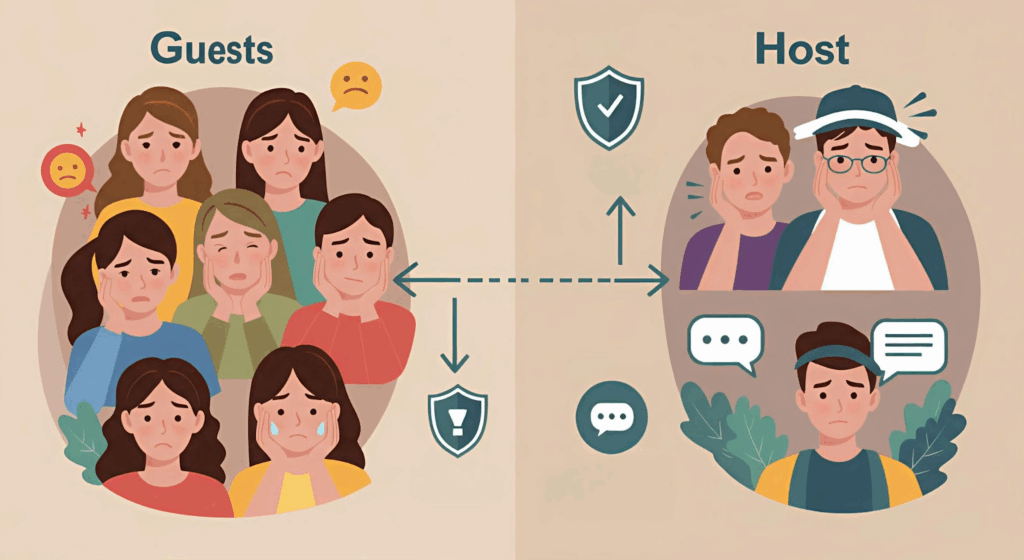
Discover how Airbnb transformed customer complaints into opportunities, shaping a $100B business model built on trust, feedback, and innovation.
Introduction: From Complaints to Billions
In 2008, Airbnb was just an experimental idea—two hosts renting out air mattresses in San Francisco. Fast forward to today, and it’s a $100B+ global marketplace redefining travel.
But here’s the twist: Airbnb’s success wasn’t built despite customer complaints—it was built because of them.
Every negative review, host frustration, or guest complaint became a blueprint for innovation. In this post, we’ll explore how Airbnb systematically turned pain points into products, policies, and a business model that disrupted hospitality forever.
You’ll learn:
- The exact strategies Airbnb used to transform feedback into growth.
- Practical lessons your business can apply today.
- Tools and tips to leverage customer complaints as a competitive edge.
Why Customer Complaints Are Gold in Business
Before we dive into Airbnb’s journey, let’s get one thing straight: complaints aren’t setbacks—they’re signals.
“Complaints are customers giving you free consulting.” – Business proverb

Ignoring them means missed opportunities. Addressing them means unlocking growth. Airbnb mastered this art by embedding customer feedback into its DNA.
Airbnb’s Journey: How Complaints Shaped the Business
1. Early Challenges: Trust and Safety
In the beginning, guests worried: “Can I trust a stranger’s home?” Meanwhile, hosts asked: “What if my property gets damaged?”
Instead of dismissing these concerns, Airbnb built solutions:

- Verified Profiles & Reviews → to create trust between strangers.
- Host Guarantee Program → up to $1M coverage for property damages.
- 24/7 Support & Safety Features → to address emergencies quickly.
Each complaint became a product feature—turning trust from a weakness into Airbnb’s biggest selling point.
2. Complaints That Built the Brand
Let’s break down a few real-world complaints and how Airbnb transformed them:
- Complaint: Guests feared scams and unsafe listings.
Solution: Airbnb introduced ID verification, secure payments, and guest reviews. - Complaint: Hosts felt undervalued.
Solution: They launched Superhost badges, priority listings, and faster payouts. - Complaint: Poor communication between guests and hosts.
Solution: Airbnb built an in-app messaging system and automated check-in guides.
This approach turned unhappy users into loyal advocates.
3. Scaling Through Systemized Feedback
Airbnb didn’t just respond reactively—it built a system for feedback-driven growth:
- Collect complaints via reviews, surveys, and support tickets.
- Analyze patterns using data analytics and customer research.
- Prioritize issues that block trust, growth, or repeat bookings.
- Implement solutions quickly, test them, and gather more feedback.
This feedback loop became their $100B blueprint.
Lessons Businesses Can Steal from Airbnb

1. Treat Complaints as Product Roadmaps
Every complaint highlights a gap. Airbnb turned each into a new feature.
👉 Pro Tip: Use feedback surveys (like those you can create on SurveyHeart) to capture issues systematically.
2. Build Trust Through Transparency
Airbnb’s review system is public, transparent, and detailed. Instead of hiding criticism, they showcase it to build credibility.
👉 Actionable Step: Publish testimonials, case studies, or even critical feedback with your solutions.
3. Personalize Solutions
Airbnb’s customer support goes beyond scripted answers. They created resolution centers, refund policies, and case-specific responses.
👉 Lesson: Show empathy first, solve second.
4. Turn Feedback into Marketing
Complaints about expensive hotels became Airbnb’s biggest marketing story: “Live like a local, cheaper than hotels.”
👉 Ask yourself: How can your customer’s frustrations with competitors fuel your unique value proposition?
Tools and Frameworks to Leverage Complaints

Here are practical tools you can use (inspired by Airbnb’s playbook):
- Surveys & Feedback Forms → Tools like SurveyHeart help collect structured data.
- Net Promoter Score (NPS) → Identify promoters vs. detractors.
- Customer Journey Mapping → Spot friction points at each stage.
- AI-Powered Analytics → Use sentiment analysis to process reviews at scale.
Framework to follow: Listen → Analyze → Act → Communicate → Repeat.
FAQs on Airbnb and Customer Complaints

Q1: How did Airbnb use complaints to grow?
By systematically turning customer pain points into new features, policies, and services, Airbnb converted weaknesses into strengths.
Q2: What is the Host Guarantee Program?
It’s Airbnb’s $1M insurance coverage for hosts to protect against property damages caused by guests.
Q3: Can other businesses replicate Airbnb’s strategy?
Absolutely. Any business can use structured feedback loops to identify problems, build solutions, and improve trust.
Conclusion: Complaints Are the Secret to Scale
Airbnb proves that complaints aren’t setbacks—they’re opportunities in disguise. By listening, innovating, and acting with empathy, they turned a few angry emails into a $100B empire.
Your takeaway: Stop fearing complaints. Start mining them for growth.
💡 Want to try it for yourself? Start small: create a free survey, gather feedback, and act on it this week.

Try SurveyHeart: Your Feedback Superpower
If you’re inspired by Airbnb’s story, you’ll love how easy it is to gather customer feedback with SurveyHeart.
- Create surveys, forms, and quizzes in minutes.
- Collect insights that drive real growth.
- Turn complaints into actionable strategies.
👉 Start free today at SurveyHeart.com.




This blog post hit all the right notes!
From the insightful commentary to the captivating writing, every word of this post is top-notch. Kudos to the author for producing such fantastic content.
I love how this blog celebrates diversity and inclusivity It’s a reminder that we are all unique and should embrace our differences
This post is jam-packed with valuable information and I appreciate how well-organized and easy to follow it is Great job!